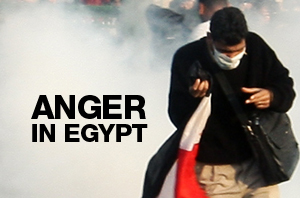Angry Egyptians defy protest ban
At least two people killed as thousands take to the streets in second day of anti-government demonstrations.

A protester and a police officer were killed in central Cairo as anti-government demonstrators pelted security forces with rocks and firebombs for a second day, according to witnesses.
Activists had called on people to rally again on Wednesday after a “Day of Wrath” the previous day saw thousands of people take to the streets across Egypt to complain of poverty, unemployment, corruption and repression.
A total of six people, four protesters and two policemen, have been killed so far in the largely unprecedented mass anger at the 30-year rule of Hosni Mubarak, the Egyptian president.
“The people want the regime to fall,” protesters chanted.
Hillary Clinton, the US secretary of state, has said that the protests represent an opportunity for the administration to implement “political, economic and social reforms to respond to the legitimate needs and interests of the Egyptian people”.
In the unusually blunt remarks regarding the longtime US ally, Clinton also said that the Mubarak government should not prevent peaceful protests or block social networking sites such as Twitter or Facebook, which have helped Egyptians plan and spread news about the unrest.
‘Cat-and-mouse game’
However, protesters faced tear gas, water cannon and beatings from the heavy police presence on the streets of Cairo. Witnesses said that live ammunition was also fired into the air.
“Despite the best efforts of the government security forces to crack down on these protests, to ban them and stop them from spreading anywhere around the streets of Cairo, they have really failed,” Al Jazeera’s Dan Nolan, reporting from the capital, said.
|
“What we’ve seen play out over the night is what can be best described as a very dangerous game of cat-and-mouse, where groups of demonstrators would gather somewhere and very quickly a very large security presence would come in an fire a volley of tear gas to disperse them.”
A protester in the centre of Cairo told the Reuters news agency: “The main tactic now is we turn up suddenly and quickly without a warning or an announcement. That way we gain ground.”
Many gathered on Gelaa Street, near central Tahrir Square – the site of a violent early morning confrontation between security forces and protesters who had been planning to sleep the night in defiance of the government.
Police fired tear gas and broke up concrete to use as rocks to throw at protesters, Al Jazeera’s Adam Makary reported.
At least 860 protesters have been arrested since Tuesday’s “day of anger”, according to the interior ministry.
In Suez, where the other four deaths had taken place the previous day, severe fighting was reported between police and protesters.
A crowd used petrol bombs to set fire to a government building and attempted unsuccessfully to do the same to a local office of the ruling National Democratic Party.
Medical personnel in Suez reported on Wednesday night that 55 protesters and 15 police officers had been injured.
“Protesters throwing burning bottle bomb into one armoured police car, setting it ablaze,” read one tweet sent by Gamal Eid, the executive director of the Arab Network for Human Rights, who was in Suez.
“Police descends onto the streets and [are] not remaining impartial. [They have] injured about 30 protesters so far,” he wrote in another.
‘Very aggressive’
In Mansoura, a working-class town north of Cairo in the Nile Delta, blogger Mohamed Hamama said the police had been “very aggressive” during protests.
“Major arrests have occurred, they are now being interrogated, a lot of people have either been injured, beaten up or exposed to tear gas,” he said.
“I think more and more protests will be staged. Many refuse to stop till they receive a good standard of living.”
|
PJ Crowley, the US state department spokesman, |
Twitter confirmed that its services had been blocked in Egypt beginning at 6 pm local time (1600 GMT) on Tuesday.
Jillian York, who oversees the Herdict web monitoring service at Harvard University, said that Egyptian Facebook users confirmed to her that the website was blocked.
Facebook, however, said it had not recorded “major changes” in traffic from Egypt.
The White House said it was monitoring the situation in Egypt “quite closely,” but unlike Clinton did not call for reform.
Robert Gibbs, a spokesman for President Barack Obama, told reporters on Wednesday that the government should “demonstrate its responsiveness to the people of Egypt” by recognising their “universal rights.”
Asked whether the United States still “backed” Mubarak, Gibbs said only that “Egypt is a strong ally”.
Amr Moussa, the secretary-general of the Arab League, said that he believes “the Arab citizen is angry, is frustrated.”
“That is the point,” he said. “The name of the game is reform.”
With just eight months to go before a presidential election that could see the ailing Mubarak run for re-election or attempt to hand power to a successor, protesters in Egypt were demanding solutions to the country’s grinding poverty and an end to onerous emergency national security laws in place since the 1981 assassination of Mubarak’s predecessor, Anwar Sadat.
“Down with Hosni Mubarak, down with the tyrant,” chanted the crowds. “We don’t want you!”
Mubarak, 82, has not appointed a deputy since he became president and is widely thought to be grooming his son Gamal to succeed him.
